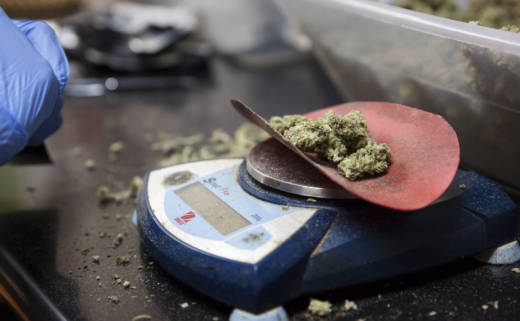The donations for Proposition 64 have been lopsided. The state's Fair Political Practices Commission calculates that over $20 million has been spent by those who want to see the measure passed. Meanwhile, opponents have kicked in only $2 million. The campaign to legalize appeared much more organized this go-round, and it has been ahead in the polls for months.
Proponents of Proposition 64 say the measure would finally bring the marijuana industry out into the open. They have been pitching the proposition as a thoughtful measure that takes lessons from other states that have legalized. Supporters stress that there are protections to prevent monopolies from forming in the marijuana business, and that legalizing would bring a windfall of new tax revenue for the state. The California Department of Finance estimates that the measure could bring in $1 billion a year through taxes on the cultivation and sale of cannabis.
Opponents have raised concerns that range from public safety impacts to moral qualms. On the public safety side, the No on 64 campaign has sounded alarms about the possibility of increased teen drug use, the corporatization of marijuana, secondhand smoke and DUIs. The determination of what constitutes “drugged driving” has become a big issue. How high is too high to drive? There’s currently no answer to that question.
"We are, of course, disappointed that the self-serving moneyed interests behind this marijuana business plan prevailed at the cost of public health, safety, and the wellbeing of our communities," Ventura Police Chief and President of the California Police Chiefs Association Ken Coreny said in a written statement. "We will take a thorough look at the flaws in Proposition 64 that will negatively impact public health and safety, such as the initiative’s substandard advertising restrictions and lack of prosecutorial tools for driving under the influence of marijuana, and begin to develop legislative solutions."
Cannabis growers in places like Humboldt and Mendocino counties are divided on the issue. Some are happy to finally be able to go legit after decades of friction with law enforcement. But there is a lot of concern. Many worry that large corporations are going to get into the business -- players from Big Ag, tobacco and alcohol -- and that the cultivator culture in the Emerald Triangle will be snuffed out. At the very least, many are afraid legalization would cause the price of marijuana to continue to drop, making it impossible for small growers to earn a living. Some are dubbing the potential change as the “Wal-Martization of weed.”
Proposition 64 leaves a lot of questions about the marijuana industry on the table. It is still a Schedule 1 narcotic federally. Those in the marijuana business will have difficulties when it comes to banking and can’t transport the drug across state lines. Many of the regulatory decisions about the cultivation and sale of marijuana will be left up to local authorities. Some locations may, in fact, choose to ban the sale of marijuana entirely.
"Prop. 64 will allow California to take its rightful place as the center of cannabis innovation, research and development," wrote Nate Bradley, head of the California Cannabis Industry Association. He acknowledged that exactly how the state will regulate legal use of marijuana is a work in progress. "We look forward to working with state on creating a regulatory structure that will protect consumers and the general public as a whole.”
